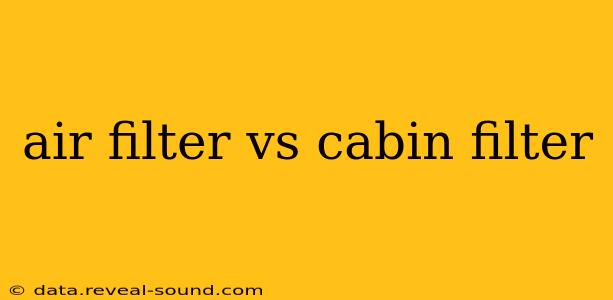Choosing the right filter for your car can be confusing, especially when you're faced with terms like "air filter" and "cabin air filter." While both are crucial for maintaining your vehicle's health and your comfort, they serve very different purposes and are located in separate areas. This comprehensive guide will clarify the distinctions, highlighting their functions and importance.
What is an Air Filter?
The air filter, also known as the engine air filter, is a critical component of your car's engine. It's located within the engine compartment, usually in a black plastic housing near the engine. Its primary function is to protect the engine's delicate internal parts from damage caused by dirt, dust, pollen, insects, and other airborne contaminants. These contaminants, if ingested, can lead to decreased engine performance, reduced fuel efficiency, and even costly repairs. A clean air filter ensures your engine receives clean, uncontaminated air, allowing it to operate efficiently and extend its lifespan.
How often should I change my engine air filter?
The recommended replacement interval for your engine air filter varies depending on your driving conditions and the manufacturer's recommendations. However, a general rule of thumb is to replace it every 12,000 to 15,000 miles or once a year, whichever comes first. If you frequently drive on dusty or unpaved roads, you may need to change it more frequently. A dirty filter will restrict airflow, impacting engine performance.
What is a Cabin Air Filter?
The cabin air filter, also known as the pollen filter or HVAC filter, is located inside the car's cabin, typically near the blower motor beneath the dashboard or glove compartment. This filter cleans the air that circulates through your car's ventilation system, protecting you and your passengers from harmful contaminants. These contaminants include pollen, dust, mold spores, exhaust fumes, and other airborne particles that can trigger allergies, respiratory problems, and other health issues. A clean cabin air filter ensures you breathe cleaner, fresher air while driving.
How often should I change my cabin air filter?
Similar to the engine air filter, the recommended replacement interval for your cabin air filter depends on driving conditions and manufacturer recommendations. However, it's generally recommended to replace it every 12,000 to 20,000 miles or every 12 to 18 months. If you have allergies or suffer from respiratory problems, you may need to change it more frequently.
What are the consequences of neglecting to replace either filter?
Neglecting to replace either filter can have significant consequences:
- Engine Air Filter: A clogged engine air filter can restrict airflow to the engine, reducing power, fuel efficiency, and potentially leading to engine damage over time. It can also contribute to increased emissions.
- Cabin Air Filter: A dirty cabin air filter can reduce airflow, make the air conditioning less effective, and recirculate unhealthy contaminants into the cabin. This can exacerbate allergies, asthma, and other respiratory issues. It can also lead to unpleasant odors.
How can I tell if my filters need replacing?
Both filters show signs of needing replacement. Look for these indicators:
- Engine Air Filter: Visually inspect the filter. If it appears dark, dirty, or clogged with debris, it's time for a replacement.
- Cabin Air Filter: If you notice a musty odor emanating from the vents, reduced airflow, or an increase in allergy symptoms while driving, it's a strong indication that the cabin air filter needs to be changed.
What types of air filters are available?
Both engine and cabin air filters come in various types, including standard paper filters, activated carbon filters (which are particularly beneficial for trapping odors), and HEPA filters (High-Efficiency Particulate Air filters) that trap even finer particles. Consult your owner's manual for recommendations on suitable filter types for your vehicle.
This guide provides a comprehensive understanding of the differences between air filters and cabin air filters and emphasizes the importance of regular maintenance for optimal engine performance and passenger health. Remember to always consult your owner's manual for specific recommendations regarding filter type and replacement intervals.
